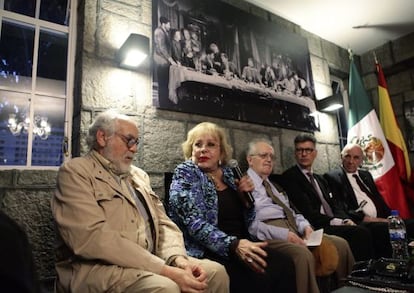All back to Buñuel’s house
Friends unite at director’s home to commemorate 30th anniversary of his death

From the 1950s onwards the Mexico City home of filmmaker Luis Buñuel was the site of large meetings of artists, passionate discussions and unbelievable encounters, always accompanied by his favorite dry martinis and, above all, lots of humor. To coincide with the 30th anniversary of his death, his house on Félix Cuevas street in Colonia del Valle, in the south of the city, has begun a new life as a study center and residence for artists. On Monday the Spanish Culture Ministry and its ICAA cinema and audiovisual arts institute invited several of the filmmaker’s old friends over to remember him. As night fell, many of them continued to pay homage to his memory in Buñuelian style: with wine, tapas and laughter.
Spain’s Culture Ministry has contributed 385,000 euros of funds to the project, which has been three long years in the making. Spanish secretary of state for culture, José María Lassalle, “officially” opened the program of activities at the director’s house: “I hope Buñuel would have liked coming here a lot and helping us build this project, which confirms our close relationship with Mexico and our interest in culture,” he said.
The house is currently the site for two film workshops run by programmer and teacher Garbiñe Ortega and filmmaker Jonás Trueba. On Monday the pair moderated a debate on the filmmaker that featured contributions from such legendary figures of Mexican cinema as actress Silvia Pinal — who worked on three of Buñuel’s masterpieces: Viridiana (1961), The Exterminating Angel (1962) and Simon of the Desert (1964) — and director Arturo Ripstein (The Castle of Purity, 1972), as well as other acquaintances of the filmmaker, including writer José de la Colina, photographer Gabriel Figueroa and actor Xavier Loyá.
Buñuel’s old house has begun a new life as a study center and artists’ residence
“I met Luis when he still hadn’t found success, because what he was doing wasn’t commercial, but I didn’t mind that. I wanted to work with him in any case,” says an excited Pinal. “That’s why I introduced him to Gustavo Alatriste, who would be his patron for a long time. All of us Mexicans should be grateful for all the affection he had for us and what he did for us.”
Events celebrating the life of a deceased artist tend to paint an unnuanced portrait, emphasizing the kindness and virtues of the person in question. But in the case of Buñuel, a man as endearing as he was cruel and as distinguished as he was openly intolerant, it’s plain to see no official act could hope to reflect his character.
“He was a bastard to be reckoned with, but a brilliant and endearing bastard,” sums up one of his old pals.
Although he was very loyal to his friends, he never hid his stern, rash and homophobic character. His youthful relationships with poet Federico García Lorca and painter Salvador Dalí were far from as friendly as the photos of them together suggest. The former he reproached for his homosexuality, while his friendship with the latter ended some years later after the painter described the filmmaker as an atheist and leftist in his 1942 autobiography The Secret Life of Salvador Dalí, which lost the-then impoverished Buñuel his job in the film department of the Museum of Modern Art in New York.
He was a bastard to be reckoned with, but a brilliant and endearing one”
Many of Buñuel’s acquaintances also spoke of his chauvinism and his lack of consideration for his French wife Jeanne Rucar. In her 1990 autobiography Memoirs of a Woman Without a Piano, she tells the story of the day he gave away her beloved piano in exchange for a case of champagne. The instrument has now been returned to the house as a gift from its owners, the family of painter Alberto Gironella.
In spite of these “nuances,” however, all those present had fond memories of the irreverent, generous and funny filmmaker, who marked a turning point in their lives and in Mexican culture. A person who, though perhaps difficult, took joy and humor with him to the grave.
Tu suscripción se está usando en otro dispositivo
¿Quieres añadir otro usuario a tu suscripción?
Si continúas leyendo en este dispositivo, no se podrá leer en el otro.
FlechaTu suscripción se está usando en otro dispositivo y solo puedes acceder a EL PAÍS desde un dispositivo a la vez.
Si quieres compartir tu cuenta, cambia tu suscripción a la modalidad Premium, así podrás añadir otro usuario. Cada uno accederá con su propia cuenta de email, lo que os permitirá personalizar vuestra experiencia en EL PAÍS.
¿Tienes una suscripción de empresa? Accede aquí para contratar más cuentas.
En el caso de no saber quién está usando tu cuenta, te recomendamos cambiar tu contraseña aquí.
Si decides continuar compartiendo tu cuenta, este mensaje se mostrará en tu dispositivo y en el de la otra persona que está usando tu cuenta de forma indefinida, afectando a tu experiencia de lectura. Puedes consultar aquí los términos y condiciones de la suscripción digital.








































